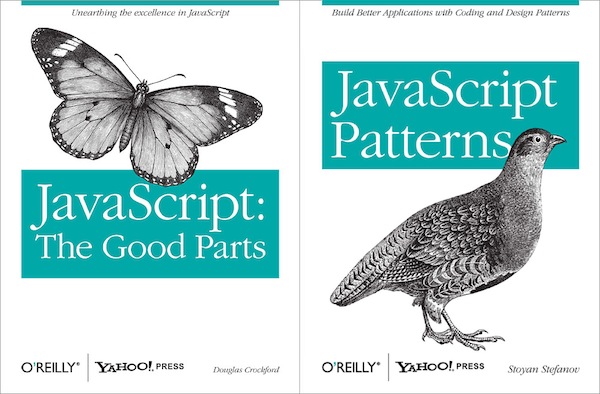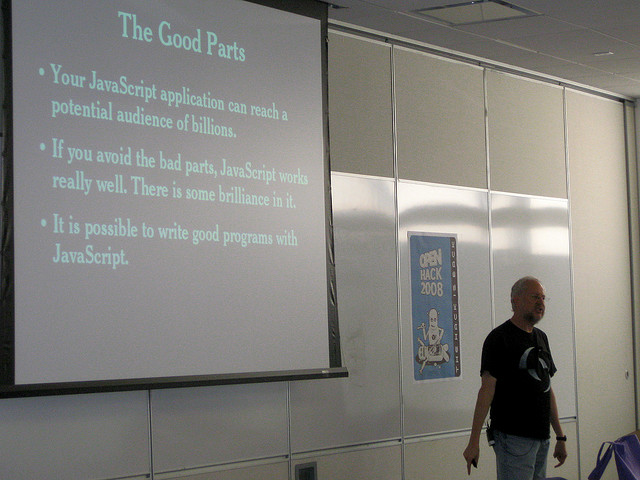JavaScript*
* for Those Wanting to Get Started with 
Marek Matczak
Inspired by

JavaScript...
...has nothing common with Java * except for some key words
...is more like “Lisp in C's clothing”
*Douglas Crockford
...has objects, but is class-free
...is of single-threaded nature
...has asynchronous programming model
...is object oriented and functional at the same time
Declaring variables
Always use var to declare variables
If you don't, they become global variables
Variable declarations get hoisted to the top of a function...
...which may be confusing:
var myVar = 'global';
var myFunction = function () {
console.log(myVar); // undefined
var myVar = 'local';
console.log(myVar); // 'local'
};
myFunction();
The above code behaves as if it looked like this:
var myVar = 'global';
var myFunction = function () {
var myVar;
console.log(myVar); // undefined
myVar = 'local';
console.log(myVar); // 'local'
};
myFunction();
Single var pattern
Eliminates logical errors caused by hoisting
var a = 1,
b = 2,
sum = a + b,
myVar,
hello = function () {
return 'Hello!';
};
Objects
can be created in a very convenient way with object literals:
var emptyObject = {},
person = {
firstName : 'John',
lastName : 'Example',
age : 30
};
Objects
Values' retrieval
var person = {
firstName : 'John',
lastName : 'Example',
age : 30
}, salutation, street;
// retrieval
person.firstName // 'John'
person['lastName'] // 'Example'
person.salutation // undefined
salutation = person.salutation || ''; // the default operator
person.address.street // throws TypeError
street = person.address && person.address.street // undefined
Objects
Values' update and properties' removal
var person = {
firstName : 'John',
lastName : 'Example',
age : 30
}, salutation, street;
// update
person['firstName'] = 'Joe';
person.age = 33;
// delete
delete person.age;
Functions
are objects
can be created with function literals:
var add = function (a, b) {
return a + b;
};
add(1, 2); // 3
Functions
stored as properties of objects...
var person = {
firstName : 'John',
lastName : 'Example',
age : 30,
letMeIntroduceMyself : function () {
return 'My name is ' + this.firstName + ' ' + this.lastName;
}
};
person.letMeIntroduceMyself(); // My name is John Example
person.firstName // 'John' - no privacy
...are called methods:
Scope
is defined by functions, and no {} blocks
var myFun = function (someInput) {
var a = 1, b = 2,
yourFun = function () {
var b = 22, c = 3;
// at this point a = 1, b = 22, c = 3
a = 11;
};
// at this point a = 1, b = 2, c is not defined
yourFun();
// at this point a = 11, b = 2, c is not defined
};
myFun();
Closure
enables a function to keep its creation context
var myObjectFactory = function (param) {
var value = 'Value';
return {
theseAreMySecrets : function () {
return 'value = ' + value + ', param = ' + param;
}
};
},
myObject = myObjectFactory('Param');
myObject.theseAreMySecrets(); // value = Value, param = Param
myObject.value; // undefined
...even if its lifetime is shorter than the function's one
Module Pattern
makes use of function scope and closure
var person = (function () {
var details = {
firstName : 'John',
lastName : 'Example',
age : 30
};
return {
letMeIntroduceMyself : function () {
return 'My name is ' +
details.firstName + ' ' + details.lastName;
}
};
})();
person.letMeIntroduceMyself(); // My name is John Example
person.details; // undefined
is widely used for programming services in 
Constructor function
is intended to be invoked with the new prefix (forgetting it makes this bound to the global object!)
creates a new object with a hidden link to its prototype
is kept in a variable with a capitalized name by convention
var Person = function () {
this.firstName = 'John';
this.lastName = 'Example';
this.age = 30;
}, johnExample;
Person.prototype.letMeIntroduceMyself = function () {
return 'My name is ' + this.firstName + ' ' + this.lastName;
};
johnExample = new Person();
johnExample.letMeIntroduceMyself(); // My name is John Example
johnExample.firstName; // 'John' - no privacy
is used for defining controllers in 
Prototypal inheritance
var create = function (from) { // added to ECMAScript 5 as Object.create
var F = function () {};
F.prototype = from;
return new F();
},
parent = {
firstName : 'John',
lastName : 'Example',
letMeIntroduceMyself : function () {
return 'My name is ' + this.firstName + ' ' + this.lastName;
}
}, child;
child = create(parent);
child.firstName = 'Joe';
parent.letMeIntroduceMyself(); // My name is John Example
child.letMeIntroduceMyself(); // My name is Joe Example
In  scopes prototypically inherit from each other
scopes prototypically inherit from each other
Functional inheritance
var parent = function (my) {
var that = {},
details = {
firstName : 'John',
lastName : 'Example',
};
my = my || {}; // keeps secrets shared in the inheritance chain
my.details = details; // makes details shared by descendants
that.letMeIntroduceMyself = function () {
return 'My name is ' + details.firstName + ' ' + details.lastName;
};
return that;
},
child = function(name) {
var my = {},
that = parent(my);
my.details.firstName = name;
return that;
};
johnExample = parent();
joeExample = child('Joe');
johnExample.letMeIntroduceMyself(); // My name is John Example
joeExample.letMeIntroduceMyself(); // My name is Joe Example
joeExample.firstName; // undefined
Summary
